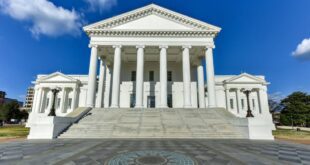Greenpeace Defends ‘Proportionate’ Protest at PM’s Home
Greenpeace has defended its anti-oil protest following criticism of a “major security breach” at Rishi Sunak’s constituency manor house. Areeba Hamid, the group’s co-executive director, said the protest had been carefully planned and would not have taken place if the prime minister had been present. Hamid told Sky News that the protest was a “proportionate response to a disastrous decision” by Sunak to allow for further drilling. She added that the activists had knocked on the door and made it clear to those present who they were before proceeding. Hamid emphasized that security is a crucial aspect of Greenpeace’s activities and that the protest had been meticulously planned with the knowledge that Sunak would not be there.
The Controversy of Housing Asylum Seekers on a Floating Detention Ship
Suella Braverman is not the first Conservative home secretary to propose housing asylum seekers on a vessel in UK waters. In 1987, Douglas Hurd approved the use of the Earl William, a former Sealink ferry, as a 120-person facility at the port of Harwich, Essex. Although the plan was met with criticism from refugee groups and the Labour party, the Home Office defended it, stating that they were facing a shortage of accommodation. The controversial scheme went ahead, and some Sri Lankan Tamil refugees were moved onto the vessel. However, the refugees went on a hunger strike to protest the delay in processing their asylum appeals. The media attention garnered from their hunger strike led to the protest ending after several weeks. The Earl William’s future as a detention center was put under review by the government. Natural forces came into play when the Great Storm of October 1987 hit the UK, causing severe damage. The Earl William broke free from its moorings and was damaged. The individuals on board were eventually rescued after a 14-hour ordeal, with many offered temporary asylum on compassionate grounds. The government subsequently reviewed the use of the Earl William as a detention center.
Responses to the Greenpeace Protest
Jon Fuller, a climate activist from Extinction Rebellion, has expressed his support for the Greenpeace protest on the roof of Rishi Sunak’s constituency manor house. Fuller argued that the damage caused by climate change has driven people to take such actions out of fear. He stated that young people are especially frightened by the government’s lack of action despite the fear-inducing message on their website. Fuller commended the protestors for their non-violent approach. Meanwhile, three men and two women who participated in the protest have been released on bail after their arrest.
Criticism of Financial Support for Ultra-Low Emission Zone (Ulez)
The mayor of London, Sadiq Khan, recently announced an expansion of the financial support available to mitigate the impact of the ultra-low emission zone (Ulez). However, Maria Caulfield, a health minister, believes that the announcement falls short of addressing people’s concerns. Caulfield argued that the £2,000 grant offered to replace heavily polluting cars is insufficient, as used car prices have risen. She also highlighted that the expansion in eligibility would only come into effect shortly before the Ulez expansion. Susan Hall, the Conservative candidate for London mayor, echoed Caulfield’s criticisms, calling the financial support a waste of taxpayers’ money. Hall stated that the grants and expansion would have little impact, based on the government’s own assessment.
Plans to Further Privatize NHS
Health minister Maria Caulfield has announced plans to relax rules governing contracts awarded by the NHS, leading to increased private sector involvement. Caulfield argued that using the independent sector is cost-effective and helps create additional capacity to alleviate pressure on hospitals. She stated that currently, the independent sector accounts for only 8% of the NHS budget. Caulfield acknowledged that some community diagnostic centers would be operated by the private sector, but emphasized that the majority of the new centers would still be under NHS management. Health Secretary Steve Barclay is expected to propose greater use of private and third-sector providers to reduce post-Covid waiting lists.
 Mind Uncharted Explore. Discover. Learn.
Mind Uncharted Explore. Discover. Learn.



